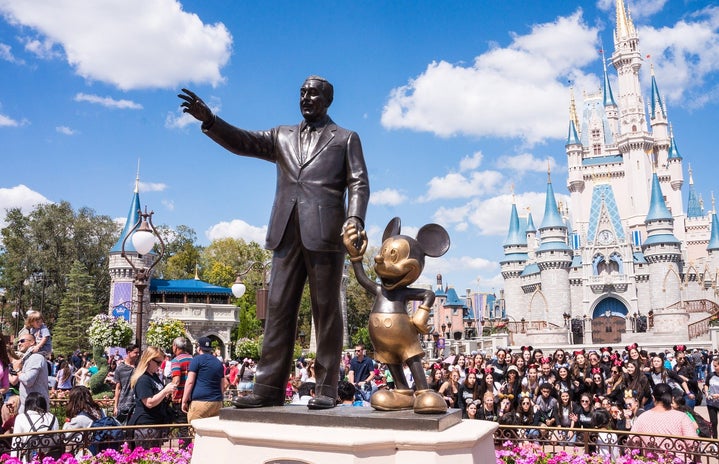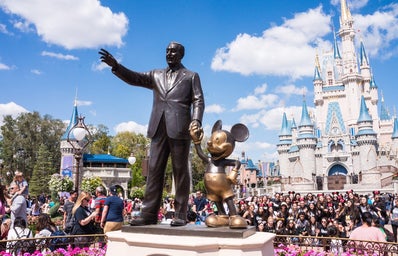It’s hard to imagine growing up without the presence of Disney. For better or worse, countless childhoods have been shaped by the carefully crafted spectacles of princesses, talking animals, and wicked villains. In the studio’s 100 years (in case their marketing campaign somehow failed to reach you, the entertainment conglomerate is celebrating its centennial this year), Disney has been responsible for some of the most beloved stories and characters to ever grace the silver screen, from the very first animated feature Snow White and the Seven Dwarves (1937) to more recent zeitgeists like Frozen (2013). I think most look back on the movies of their childhood with a wistful fondness that time only strengthens. This is what Disney’s latest endeavor, Wish, is counting on. Desperately.
The film follows Asha (Ariana DeBose) and the citizens of Rosas, a fictional kingdom on an island in the Mediterranean. In this kingdom, citizens all give up their deepest and most true wish to King Magnifico (Chris Pine), forgetting that wish in the process until the day comes that the King decides to make it come true. Conflict arises when Asha realizes some wishes will never be granted, and the King refuses to give them back to allow his subjects to pursue their dreams on their own. He believes life is happier for all without the weight of passions and desires that could be crushed at any moment. “I decide what everyone deserves,” he insists. After all, his subjects seem happy enough not knowing what they’re missing. Rosas is described as a place with “no what-ifs and no wonders.” Unfortunately, this descriptor sums up the rest of the film as well. Despite its boasting of being a story “100 years in the making,” Wish is remarkably safe and unambitious by design, and has that all-too-familiar feeling that a corporate airbrush has been all over it.
This isn’t to say the film is bad; a more apt description might be “generic.” It’s unoffensive in its entirety, and the tried and true combination of a colorful dress and an animal sidekick is almost sure to entertain children and sell a few toys. Asha (actually an Arabic name meaning “wish”) as our protagonist is a completely blank slate with no notable individuality beyond a strong sense of justice (which can be said about most Disney heroes) and the wish to help her family. At the risk of repeating myself, she is capable of offending no one; but it’s a double-edged sword that means she is equally unable to inspire or connect with anyone either. This is a shame — Asha is only Disney Animation’s second black protagonist and DeBose herself is an activist and the first openly queer woman of color to win an Oscar. Asha is joined by her pet baby goat, Valentino (Alan Tudyk) (who is granted the ability to speak about twenty minutes into the film), and by Star, who is (you guessed it) a wishing star brought down to Earth by Asha’s pleas. Star is adorable, mischievous, and pure of heart, and his presence in the film is for the better, even if his weight on the narrative isn’t particularly heavy. Asha has a group of friends, but their impact is less than Star’s, and their names I can’t even be sure of. (Again, a shame with names like Evan Peters and Harvey Guillén in the cast.)
With clients like Selena Gomez, Justin Beiber, and Demi Lovato under her belt, Julia Michaels is no newcomer to songwriting, but bringing her on to write for Wish was a choice that is as intriguing as it is baffling. There are a few standout songs, the winner in that lineup being the theme, “This Wish.” Another notable number, “Knowing What I Know Now” also comes to mind, but even so, it’s noticeably weaker. As Disney musicals go, this one has a frightening number of misses that range from forgettable to hard to sit through. “At All Costs,” a duet between Magnifico and Asha, is startlingly out of place; if you told me it was actually written with this film in mind, that would be the most surprising thing Wish had mustered yet. A celebration of the return of the Disney villain song may have been hasty — Pine does his best, but he’s no vocalist, and his number, “This Is The Thanks I Get?!” leaves a lot to be desired. Michaels’ background in pop and her lack of experience in musical theatre or soundtrack is evident. The influence of Lin-Manuel Miranda’s songwriting on Disney is equally apparent (but hopefully not irreparable). With that said, Ariana DeBose’s reputation as a Broadway powerhouse doesn’t fail her and her vocals do ring as a strong point, even where the writing fails her.
The film’s main draw is in the visuals, which are undoubtedly top-of-the-line. Unsurprising, since Disney has reveled in the chance to show off its technical prowess since the days of technicolor. While at a glance, the film could look like almost every other modern Disney film, a few elements come together and give it a fresh coat of paint, so to speak. The designs, not necessarily of the characters themselves but of their costumes, are beautifully intricate (and contain some fun Easter eggs, if you can spot them). Asha in particular has a Medieval North African-inspired look, a pleasant surprise with a region so often neglected in media. The animation, while the usual 3D CGI, has a kind of overlay that allows it to somewhat mimic some traits of 2D animation. This 3D/2D hybrid style has become something of a popular trend with movies like Spider-Man: Into the Spider-Verse (2018) and Puss in Boots: The Last Wish (2022) (incidentally a much better movie also about a wishing star), to name a few. Disney pays homage (and trust me, they do a lot of that in this film) to the traditional method of painted backgrounds, one of the strongest elements of the movie in the end. There’s even a bit of traditional, hand-drawn animation here and there, a return to Disney’s roots that hopefully doesn’t stop with this film.
On the topic of paying homage…this film does it in excess. Disney is celebrating 100 years since its establishment and they aren’t about to let anyone forget it. Wish isn’t, at any point, permitted to stand on its own as a film. Lest you forget which studio made Snow White and the Seven Dwarves (1937), Cinderella (1950), Peter Pan (1953), or Zootopia, the film cheapens itself by making constant references with varying levels of subtlety. At the end of the film, fireworks explode over the castle in the perfect image of the famous Mickey Mouse ears. I’m not kidding. There’s even an attempt to “connect” all the Disney films into an almost MCU-like universe. After all, this film was created to show us the origin of that oh-so-famous wishing star. The credits roll with drawings to represent every Disney movie since Snow White. This is, in a most tragic way, a perfect representation of what Disney has become over the course of a century — a product. Disney is banking on nostalgia, but they may have taken it a step too far this time. Perhaps it’s unfair to call it a hodge-podge of better movies — to be that, it would have to have carried over any of the charm or appeal of those movies. The biggest studio in the world is in every position to take risks and create something great — they’ve done so in the past in far more precarious circumstances — but their priority in their latest film is safety, a priority that has already backfired as Disney sees their record box office streak of over a decade come to an end. Safety is the enemy of creativity, a message from their own movie that was missed.
The most unfortunate thing about Wish is that there very truly is a metaphor within it that Disney CEO Bob Iger and his Board of Directors have missed: Asha and the citizens of Rosas are the creatives in the studios, trying to follow their passions and share their creativity with the world, and King Magnifico is the beast of corporate oversight, deciding which wishes are “good” and which will never see the light of day. It seems the meddling of company executives turned what could have been a very impactful story and a celebration of the power of art into a high-budget advertisement for DisneyWorld.
Wish is, on all fronts, a desperate attempt to remind you of the “good old days” of a studio that seems to be in a tailspin. In the months since its initial announcement, the film made a number of promises that excited animation enthusiasts and general audiences alike but sadly, left them disappointed. Audiences wanted the return of 2D animation, for Disney to try new stylistic choices, for the return of the classic Disney villain — but with Wish as the outcome, we’re left only with a lesson as old as time: Be careful what you wish for.


